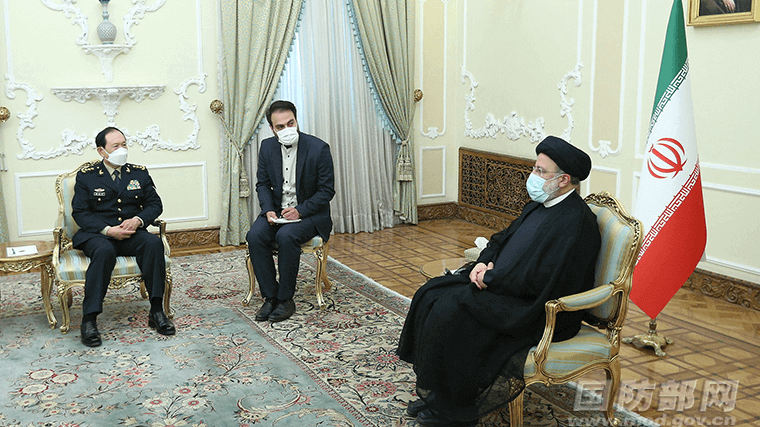Iran and China have agreed to challenge the United States’ (US) global dominance by enhancing military ties, Iranian President Ebrahim Raisi said during a meeting with Chinese Defence Minister (DM) Gen. Wei Fenghe in Tehran on Wednesday.
Raisi said that Tehran’s relations with Beijing are strategic in nature and stressed, “We pursue these strategic relations regardless of international developments and based on mutual political trust,” he stressed.
Stating that the US’ “unilateralism and hegemony” are “aimed at controlling countries and preventing the formation of a sustainable economic growth in the world,” Raisi emphasised that this could only be challenged if “independent and like-minded powers” like Iran and China pursue closer ties.
President Raisi: High-ranking officials of #Iran and #China have a serious will to promote long-term strategic ties, regardless of international developments https://t.co/dJ294gkr43 pic.twitter.com/p9XjOMdiks
— Government of the Islamic Republic of Iran (@Iran_GOV) April 27, 2022
The President said that even though the US unilaterally withdrew from the 2015 nuclear deal and put intense pressure on Iran through sanctions, Washington has “failed miserably in exerting maximum pressure on Iran.” He added, “The Iranian nation has shown that its ideal rights and demands can be achieved through resistance and perseverance.”
In this respect, Raisi said there is great scope for China to enter into a mutually beneficial relationship with Iran. “Iran’s unique capabilities in the field of inter-regional transportation, Iran’s capacities in providing the security of various types of energy, as well as regional infrastructure cooperation are serious grounds for cooperation and investment,” he added. Raisi also told Gen. Wei that the priority for both countries in this regard should be the “successful implementation of the 25-year comprehensive cooperation programme.”
In March, China and Iran signed a 25-year strategic cooperation agreement that focuses on bilateral cooperation in various fields, including economic and cultural ties. With the signing of the pact, China aims to bring Iran into the fold of its flagship Belt and Road Initiative (BRI) and in turn hopes to expand its economic and political influence in the region.
سفر ارتشبد وی فنگ هه عضو شورای دولتی و وزیر دفاع چین به ایران با موفقیت انجام شد. pic.twitter.com/c1IKJAyIV5
— Chang Hua (@AmbChangHua) April 27, 2022
Welcoming Raisi’s suggestions, the Chinese DM said, “Strengthening relations between Iran and China is always security-building for the region and the world, especially in the current crisis and turmoil.” Saying that unilateralism hinders the sustainable economic growth of the world, Gen. Wei underscored that “Iran and China can cooperate with each other in all global issues and contribute to the development of peace in the world.”
Furthermore, the Chinese Defence Ministry stated that Gen. Wei asserted during the meeting that “China firmly supports Iran in safeguarding state sovereignty and national dignity, and stands ready to work with Iran to cope with various risks and challenges.” Gen. Wei called for the expansion of military ties and focus on maintaining “strategic communication” between each other’s armed forces.
Gen. Wei also met with his Iranian counterpart Mohammad Reza Ashtiani and military chief Mohammad Bagheri, wherein both sides agreed to deepen cooperation in the fields of services and arms, joint exercises, and personnel training. They also exchanged views regarding the Iranian nuclear deal talks and the situation in Ukraine.
Beijing has emerged as a strong supporter of the Islamic Republic. Apart from trying to make Iran a crucial part of the BRI, China, which was one of the signatories to the 2015 nuclear deal, has supported Iran’s position in the ongoing nuclear talks with world powers in Vienna.

